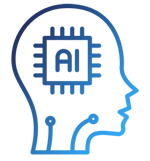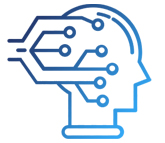- AI

Artificial Intelligence

Smart Products & Services
We follow Smart Products & Services

Intelligent Business Functions & Processes
We follow Intelligent Business Functions & Processes

Robotic Process Automation
We follow Robotic Process Automation

Personalized
healthcareWe follow Personalized healthcare

Identifying at-risk patients
We follow Identifying at-risk patients

Optimized routing and scheduling
We follow Optimized routing and scheduling
- ML

Machine Learning

Predictive
AnalyticsWe follow Predictive Analytics

Service Personalization
We follow Service Personalization

NLP
We follow NLP (Natural Language Processing)

Stock Market Forecasting
We follow Stock Market Forecasting

Fraud Prevention
We follow Fraud Prevention

Recommender engines
We follow Recommender engines
- blockchain
- IOT

Internet of Things
- AR
- Business Solutions

Business Solution

Business Performance Management
We follow Business Performance Management

Decision Making & Big Data Analytics
We follow Decision Making & Big Data Analytics

Enterprise Data Management
We follow Enterprise Data Management
- Apps

Apps

Native Apps
We follow Native Apps

Cross Platform Apps
We follow Cross Platform Apps

Web Apps
We follow Web Apps

Hybrid Apps
We follow Hybrid Apps

Cloud Native Apps
We follow Cloud Native Apps
- Lab

The Impact of Artificial Intelligence on World Economy Growth
Artificial intelligence and machine learning are being adopted by industries across all sectors such as education, healthcare, agriculture and many other sectors that have led to exponential growth in the global economy. Most countries have given extreme thought in respect to AI supremacy, with the majority of the world’s largest economies having announced and commenced with their own implementation of AI practices. There is no denying of the fact that AI will be profound in the upcoming future, ensuring the significant devotion of resources towards AI by organizations on a long term basis. The use of AI will give countries a substantial competitive advantage in the global economic arena where leading companies come up with effective strategic approaches towards the design and development of mobile applications bringing a great boost in AI economy respectively.
Keep up with Technology
Changes are already taking place having already being immersed and transitioned into the digital world where virtual and augmented reality is seen as the hot trend in present and future times. The use of AI in applications has entirely changed the way we perceive things, from optimizing processes to a wide range of possibilities that have brought a great impact in the economical and physical lives of us humans. AI will continue to benefit professional individuals having a great deal of flexibility and strong decision making skills, but the dark negative side lies in AI powered robots that will increase job insecurity, these machines will be seen as a threat to society replacing manual intensive tasks to automated optimized processes for speedy work.
AI Combined with App Development
The growing ability of AI to solve complex autonomous tasks are now sought by AI app development company who amalgamate AI practices into their design and development of apps to bring about a massive change and innovation in the design and development of applications. For instance the use of virtual assistants adapt to the constantly changing and evolving surroundings, aiding to helps users in a variety of ways by answering questions to home automation are seen by devices such as Google Home, that is still learning and evolving to deal with better complex situations.
The Dark Side of Artificial Intelligence
The development of AI will bring a significant change in international trade and economic growth. One is the macroeconomic factors is the trade effects that will have an impact due to AI introduction. For example, the increase in productivity levels will increase economic growth and open up new opportunities to international and local trade. However, the use of AI is likely to speed up automation that leads to a negative economic impact of artificial intelligence due to job insecurities in manufacturing fields, being prevalent in the future years. AI will transition towards service economies that have its weighing benefits and disadvantages accordingly, posing a threat emerging from machines taking over the service sector.
The Reaping Benefits of AI and Its Effectiveness
However, the benefits of artificial intelligence are not to be ignored, global value chains utilize AI to anticipate future trend changes, shifts in consumer demands and better risk management strategies can improve the overall efficiency and effectiveness for firms across all sectors. Another sector where AI is already being amalgamated is in ecommerce websites that have completely transformed user shopping experience to an ultimate level. AI has now initiated the commencement of a new visual search engine that has the capability to offer personalized recommendations. The search engine analyzes user input and displays preferences relates to the brand they follow. This has led AI raising its marketing standards to different heights, firms giving up on traditional marketing methodologies.
Merger Between IOT and AI
Customer centric approaches are increasingly imperative for firms to achieve greater success. IOT app development company is already combining IOT and artificial intelligence in the key to find valuable customer insights. The concept of machine learning has helped business automatically identify visual patterns to the key performance indicators that help firms determine the changes and modifications to achieve spectacular heights of product effectiveness and efficiency. Anomaly detection seems easier with AI in addition the capability to make operational predictions at an earlier period of time with great precision and accuracy. However, artificial intelligence problems are still prevalent since systems are usually involved in the training phase to learn multiple possibilities and identifying the right patterns. This limits systems to cover all possible examples, increasing the chances to fool the system in tasks human wouldn’t.
Influence Economic
The application of artificial intelligence in economics is best known with the introduction to crypto currency that has transformed the industry with the offshoot of this technology. The potentialities of artificial intelligence with AI intersection have transformed the cyptocurrency industry. Firstly, energy consumption has been a barrier spearheaded when mining cryptocurrency that require an unrealistic amount of power for its effective production. AI has already proven it’s self by providing energy efficient solution hence, leading to lower investment in mining hardware. Cryptocurrency also leads to better security, privacy, and scalability as well. The impact of artificial intelligence on economic growth can be seen as trade market moving rapidly by high frequency trading also known as automatic trading. For instance if someone decides to purchase large bit coin from HFT but misses out on, so through automation it can arrange for cryptocurrency from other crypto exchanges thus, eliminating the issue of dead crypto bitcoin.
Widening Gaps with The Adoption of AI
The impact of artificial intelligence on the world economy will be seen as a widening gap between workers, experiencing shifts in the demand for skills. Potential shifts in workforce demand, with the need to shift occupations and working with machines is prevalent in the near future ahead of us. Workers pose a great deal of threat of being replaced by machines in addition with rising wage rates and the eligibility of hiring those groups who possess superior enriched skill set will create a potentially widening gap between workers, companies and countries respectively.
Concluding, AI is internationally and locally recognized as a growing driver towards the expansion of multiple possibilities that ensure productivity, competitiveness and efficiency in the future to come. However, there are many challenges involved concerning artificial intelligence such as analyzing and understanding huge data sets, difficulties in generalizing results and many more that need to overcome to execute successful AI technology.
Read Article: How IoT Will Revolutionize Web Design & Development in 2020?



















































Leave a Reply